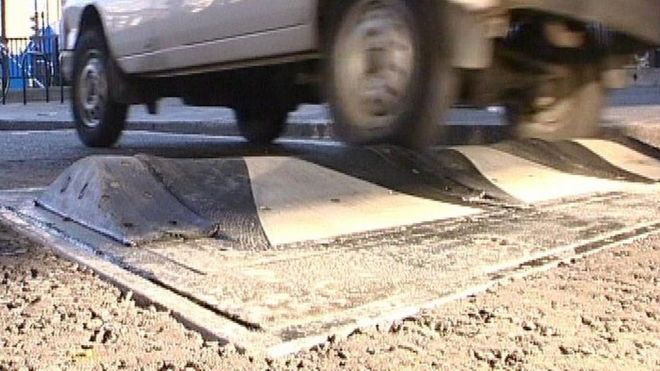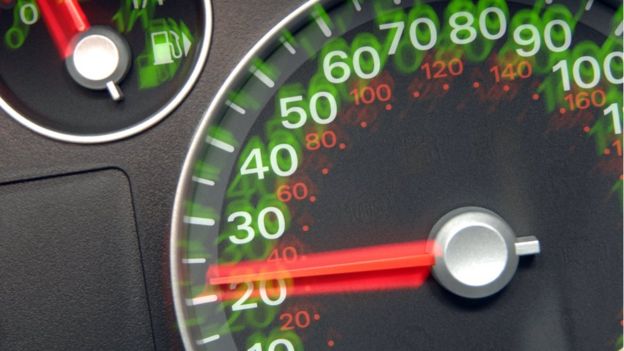Futures Forum: "Over 40,000* people die each year in the UK directly because of air pollution and it is simply unacceptable."
And much of this is caused by cars.
Here's a novel idea:
Councils urged to redesign speed bumps to cut pollution
- 1 December 2016
- Health
- 766

Local authorities should consider lower speed limits, clean air zones and even redesign speed bumps in a bid to reduce air pollution, health experts say.
The National Institute for Health and Care Excellence (NICE) said "smooth" driving would cut air pollution, linked to 25,000 deaths a year in England. But pollution experts said the measures will only make small improvements.
Prof Ian Colbeck, of the University of Essex, said the plans pressured local government at a time of budget cuts.
The health advisory body's guidance is now out for consultation.
Air pollution disproportionately affects people living in deprived and urban areas, especially children and the elderly.
Soot and gas
Figures show that motor vehicle traffic reached a record high in 2016, with 320 billion vehicle miles travelled on Great Britain's roads - a 1.4% increase on last year.
NICE says tiny specks of soot from vehicle exhaust, brake linings and tyres, as well as nitrogen dioxide gas, damage people's health by increasing the risk of cancer and respiratory and heart diseases. As a result, it is urging local authorities to do more to tackle air pollution.
Its recommendations include:
- More 20mph speed limits in congested residential areas
- Re-designing speed bumps to stop cars speeding up and slowing down between them
- Restrictions on engine idling during short stops such as outside schools and hospitals
- More charging points for electric cars in residential areas
- Placing the most commonly-used rooms in new houses away from polluting roads
- Training drivers to be more fuel efficient by driving more smoothly
 SCIENCE PHOTO LIBRARY
SCIENCE PHOTO LIBRARY
It also suggests avoiding putting cycle lanes on highly polluted roads and considering the use of trees to screen cyclists from motor vehicles - but it warns that this should not be at the expense of street ventilation, which helps the air pollution to disperse.
The guidance says that it would be advisable to adopt a number of measures - rather than just one - because this would be more likely "to act cumulatively to produce significant change".
Samantha Heath, chief executive of the London Sustainability Exchange, who was on the NICE guideline committee, told the Today programme that "20% of emissions can be saved by smoother driving."
"This is the public health crisis of our generation," she added.
Analysis by Roger Harrabin, BBC environment analyst
Councils will need to tread carefully round the recommendations from NICE. That's because the same poor people at most risk from dirty air are also most likely to be killed or hurt by commuters' cars.
The nationwide rash of speed humps has been resisted by motoring groups because humps can damage speeding cars.
But they have also contributed to a spectacular reduction in the number of children killed and seriously injured on the roads.
There are other options, though. Councils could install speed tables at junctions, rather than humps. These are longer than speed humps and flat-topped, so they raise the entire wheelbase of a vehicle. They make it easier to hold the steady speed recommended by NICE, but they are much more expensive at a time when councils are facing heavy spending cuts.
In an ideal world drivers would drive slowly and smoothly to reduce pollution and improve safety.
'Every little helps'
Prof Richard Skeffington, from the department of geography and environmental science at the University of Reading, said there was little that was new or radical in the recommendations and many seemed "mostly common sense".
He added that there was no overall assessment of the likely effects of the proposals on air quality. "The message of the report seems to me to be 'every little helps - possibly'. The report does reject some ideas, such as street washing, but generally the actions proposed seem likely to make small incremental improvements at best."
The Local Government Association, which represents councils in England and some in Wales, welcomed the guidance and acknowledged air pollution was a massive problem, but said everything came down to money.
Cllr Martin Tett said: "There is a lot we could do if we had the funding but this is a national issue for government too. The reality is we have to pay for this today."
Councils urged to redesign speed bumps to cut pollution - BBC News
.
.
.

No comments:
Post a Comment